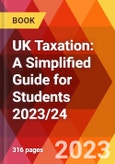UK Taxation for Students is fully updated for Finance Act 2023. This book can be used either on its own or in conjunction with other texts. It is, however, completely self-contained.
This book is written in a user-friendly manner. It includes over 180 worked examples plus true and false quizzes and a further 101 questions for readers. Complex jargon is avoided. Simple English is used. This book also assumes absolutely no prior knowledge about UK taxation. This book covers the five main UK taxes: income tax (paid by individuals), capital gains tax (paid by individuals), corporation tax (paid by companies), value added tax (levied on consumers by businesses), and inheritance tax (normally payable on the death of an individual), and National Insurance Contributions.
We have seen some significant tax policy changes since the last edition, and then many of these have already been reversed! Making Tax Digital for Self-Assessment has been deferred again but we have substantial changes introduced, including to the taxation of self-employed individuals and the first increase in the rate of corporation tax since 2007.
For students at undergraduate level. Also suitable for ACCA, ICAEW and AAT.
Table of Contents
TAX RATES AND ALLOWANCES
CHAPTER 1: Introduction
CHAPTER 2: Income Tax: General Principles and Tax Rates
CHAPTER 3: Income Tax Computations
CHAPTER 4: Extending the Rate Bands
CHAPTER 5: Income from a property business
CHAPTER 6: Trading profits
CHAPTER 7: Capital Allowances
CHAPTER 8: Sole Trader Business Losses
CHAPTER 9: Partnerships
CHAPTER 10: Employee Taxation
CHAPTER 11: Personal Tax: Overseas Aspects
CHAPTER 12: Pensions
CHAPTER 13: Capital Gains Tax: General Principles
CHAPTER 14: CGT: Shares and securities
CHAPTER 15: CGT: Business Reliefs
CHAPTER 16: Corporation Tax: General Principles
CHAPTER 17: Chargeable Gains for Companies
CHAPTER 18: Company Losses
CHAPTER 19: Groups of Companies
CHAPTER 20: National Insurance Contributions (NICs)
CHAPTER 21: Tax Administration for Individuals
CHAPTER 22: Tax Administration for Corporation Tax and Employers
CHAPTER 23: Value Added Tax
CHAPTER 24: Inheritance Tax an introduction
APPENDIX 1: How to Study Taxation: Some practical tips
APPENDIX 2: Questions for Students
APPENDIX 3: True or False Questions
Index
Author
Mark Hunt is a member of the Chartered Institute of Taxation and a senior teaching fellow at Birmingham City University and previously worked in the accountancy profession for over 25 years, specialising in all areas of taxation.








